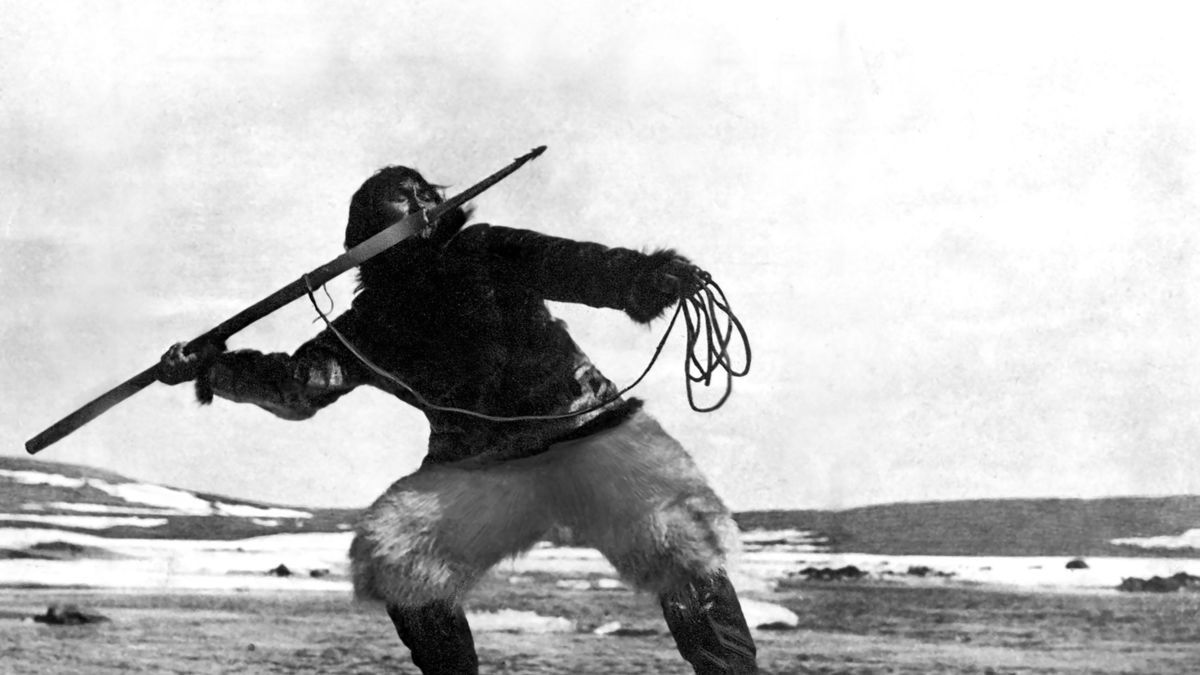
A Century After Nanook
100 ᐊᕐᕌᒍᐃᑦ ᓇᓅᑉ ᑭᖑᓂᖓᓂ
A Story of Life and Adaptation in the New Arctic
The Indigenous communities of the Arctic are experiencing the most dramatic effects of climate change on our planet. Ironically, those same people generate one of the world’s smallest carbon footprints, a reality the rest of the world benefits from. This rapidly changing environment has forced many of these communities to drastically alter their traditional way of life (New York Times 6/27/21). From the massive changes in hunting and fishing strategies, to dietary choices, to the modes of transportation, and in some instances the termination of time-honored ritual events – climate change is causing culture change. These disruptive (and costly) cultural changes are just beginning to impact other parts of the world. Since the Arctic functions as a “canary in the coal mine” with respect to climate change, we know the monumental cultural shifts for all of us are impending.
It is often discussed how climate change is pushing many species to extinction, yet many cultures face a similar fate. Few places is this more evident than the small Inuit village of Inukjuak on the east coast of Hudson Bay in northern Canada. Although the town is not well-known by name, 100 years ago the people of Inukjuak played a role that continues to influence people’s lives throughout the world. They were the co-creators of the first documentary film.
In August of 1920, an aspiring American filmmaker traveled to Inukjuak to begin documenting the daily life and struggles of an Inuk man named Allakariallak and his family. Almost two years later, on June 11, 1922, Robert Flaherty premiered his completed film – Nanook of the North: A Story of Life and Love in the Actual Arctic at the Capitol Theatre in New York City. From hunting walrus to constructing an igloo, the project is an early example of ethnographic film (albeit often staged). Nanook was the first significant non-fiction film ever released. Its immediate success added a new category to the domain of motion pictures – the documentary. In 1989, Nanook of the North was selected for preservation in the United States National Film Archives by the Library of Congress.


Kirk began collaborating with the Inuit of Inukjuak in November of 2019 with the goal of revisiting this iconic film on its 100th anniversary. The end product will be a documentary that centers on the voices and perspectives of the Indigenous people of area. Through a combination of archival footage from 1920-21, interviews with local inhabitants and climate change scientists, we are investigating the drastic environmental and cultural changes that have taken place in the region over the last 100 years.
Due to the pandemic, French's initial trips were delayed until July 2021. The next phase of the project is to assist with organizing the Nanook Centennial Celebration Event that will take place in the village of Inukjuak on June 11, 2022 - exactly 100 years from the premiere of Nanook in New York City.
In the News
The World's Marco Werman interviews Inukjuak's Town Manager, Shoamik Inukpuk and the film's director, Kirk French, about the Century After Nanook Project.

Media Team
Kirk French - Executive Producer, Co-Producer, Writer, and Director.
Neal Hutcheson - Director of Photography, Co-Producer, and Co-Editor.
Sarah Samisack - Co-Producer and Videographer.
Advisory Board
Dr. Karine Bertrand - Assistant Professor of Film Studies, Queen's University, Kingston, Ontario, Canada.
Mr. Michael Barrett - Associate Director of Renewable Resources, Environment, Lands, & Parks for the Kativik Regional Government, Kuujjuaq, Quebec, Canada.
Dr. Andrew Carleton - Professor of Geography, The Pennsylvania State University, University Park, Pennsylvania.
Dr. Boaz Dvir - Assistant Professor of Journalism at The Pennsylvania State University, University Park, Pennsylvania.
Ms. Rhoda Kokiapik - Executive Director of the Avataq Cultural Institute, Inukjuak, Nunavik, Canada.
Mr. Markusi Qisiiq - Director of Renewable Resources, Environment, Lands, & Parks for the Kativik Regional Government, Kuujjuaq, Quebec, Canada.
Tommy Weetaluktuk - Head of Archaeology for the Avataq Cultural Institute, Inukjuak, Nunavik, Canada.
Clipping from the New York American
newspaper the day after the premiere.

Clipping from the New York Globe
newspaper the day after the premiere.

Nanook Centennial Planning Committee
Shaomik Inukpuk, Rhoda Kokiapik, Sarah Lisa Kasudluak, Caroline Oweetaluktuk, Charlie Nowkawalk, Janice Kasudluak, Sarah Samisack, and Kirk French
